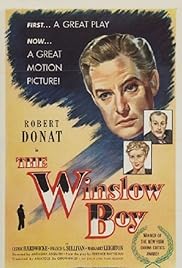WINSLOW BOY, THE
(director/writer: Anthony Asquith; screenwriters: Anatole de Grunwald/Terence Rattigan/based on the play by Terence Rattigan; cinematographer: Freddie Young; editor: Gerald Turney-Smith; music: William Alwyn; cast: Cedric Hardwicke (Arthur Winslow), Robert Donat (Sir Robert Morton), Basil Radford (Desmond Curry), Margaret Leighton (Catherine Winslow), Kathleen Harrison (Violet, maid), Francis L. Sullivan (Attorney General), Neil North (Ronnie Winslow), Jack Watling (Dickie Winslow), Marie Lohr (Mrs. Winslow), Frank Lawton (John Watherstone); Runtime: 117; MPAA Rating: NR; producer: Anatole de Grunwald; Eagle-Lion Films; 1948-UK)
“Directed with great care for feeling and detail.”
Reviewed by Dennis Schwartz
The old-fashioned courtroom drama, filmed in B/W, is based on the infamous Archer-Shee case of 1912 in England. It’s adapted from the 1946 play by Terence Rattigan and directed with great care for feeling and detail (the period settings are superb) by Anthony Asquith (“Pygmalion”/”The Browning Version”/”The Yellow Rolls-Royce”), the son of a former British P.M. The drama tells of an upper-class banker, Arthur Winslow (Cedric Hardwicke), a man of great character but only limited wealth, going all out to defend his 13-year-old son, Ronnie Winslow (Neil North), who is expelled from an elite military school at Osborne for allegedly stealing a friend’s five-shilling postal order. Dad spends his nest egg saved for retirement on proving his son’s innocence, even though it hardly makes any sense since it’s only such a petty issue. It’s based on an actual case and proves to be excellent middle-class entertainment.
The Wimbledon banker has just retired because of failing health, and is set to live a quiet life with his loving wife (Marie Lohr). After coming home from London on his regular commute, his last, he learns from his wife of his son’s expulsion and then conversing with his son and finding out he is not a thief, decides to defend Ronnie at all costs. This means he can no longer afford to pay the tuition at Oxford for his elder son Dickie (Jack Watling) or pay for his medical treatments and now must decide if he can still afford to keep his longtime maid Violet (Kathleen Harrison). Moreover, the marriage settlement for his daughter Catherine (Margaret Leighton) must instead be used to pay the expenses. Catherine’s marriage to John Watherstone (Frank Lawton) will not take place unless the young man’s father receives an assurance that the case will be dropped. Thereby, when it’s not dropped, their engagement is broken off.
Dad hires the aloof Sir Robert Morton (Robert Donat), the eminent K.C., who before he accepts harshly grills the boy in a manner that turns off Catherine. Then Sir Robert makes an impassioned speech in the House of Commons and thereby a civil trial is ordered.
At the trial, Curry (Basil Radford), the solicitor in love with Catherine, informs her that Sir Robert has gallantly turned down the appointment of Lord Chief Justice to continue the Winslow case. The trial results in victory for Sir Robert and the restoration of honor to the Winslow family. When the verdict is announced, the now 14-year-old Ronnie is seemingly the least concerned one in the family and has been at the movies.
Robert Donat is superb as the witty and elegant lawyer, who also has grit and compassion.
David Mamet remade it in 1999, and provided another outstanding version.

REVIEWED ON 6/16/2009 GRADE: A https://dennisschwartzreviews.com/